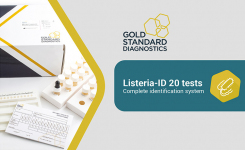Recent additions to the UK's National Collection of Industrial, Food and Marine Bacteria include an actinomycete species isolated from sediment collected from a Norwegian fjord, and two newly described species of bacteria found in the gut of a bee.
The sole strain of Verrucosispora fiedleri which has been added to the collection was discovered by Prof Michael Goodfellow MBE and his team in the School of Biology at Newcastle University. Verrucosispora strains are currently the focus of considerable interest as they are the source of new bioactive compounds and this strain could be commercially significant as a source of new anti-cancer drugs, so it is an exciting addition to the collection.
The two species of bacteria found in the gut of the honey bee were deposited by Waldan Kwong, a PhD Student in Prof. Nancy Moran's lab at Yale University, and have been named Gilliamella apicola and Snodgrassella alvi.
There is much concern about the decline in bee populations, and studying these bacteria might help scientists to learn more about bee health and ecology. Just like humans, bees have a natural community of bacteria in their intestines. Some possible roles of the two species that were deposited may be protection of the bee against parasites, or helping with the digestion of pollen, but further research is needed to find out more about the function of the bacteria and the nature of their relationship with the bee.
Culture collections like NCIMB play an important role in making strains isolated through academic research available to industry and other researchers, and NCIMB regularly ships strains from the collection around the globe.
For further information on depositing a strain with NCIMB, or to obtain these new strains email Dr. Samantha Law or Tel: +44 (0) 1224 711100
The sole strain of Verrucosispora fiedleri which has been added to the collection was discovered by Prof Michael Goodfellow MBE and his team in the School of Biology at Newcastle University. Verrucosispora strains are currently the focus of considerable interest as they are the source of new bioactive compounds and this strain could be commercially significant as a source of new anti-cancer drugs, so it is an exciting addition to the collection.
The two species of bacteria found in the gut of the honey bee were deposited by Waldan Kwong, a PhD Student in Prof. Nancy Moran's lab at Yale University, and have been named Gilliamella apicola and Snodgrassella alvi.
There is much concern about the decline in bee populations, and studying these bacteria might help scientists to learn more about bee health and ecology. Just like humans, bees have a natural community of bacteria in their intestines. Some possible roles of the two species that were deposited may be protection of the bee against parasites, or helping with the digestion of pollen, but further research is needed to find out more about the function of the bacteria and the nature of their relationship with the bee.
Culture collections like NCIMB play an important role in making strains isolated through academic research available to industry and other researchers, and NCIMB regularly ships strains from the collection around the globe.
For further information on depositing a strain with NCIMB, or to obtain these new strains email Dr. Samantha Law or Tel: +44 (0) 1224 711100

















